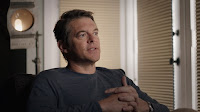In the future, the Blumhouse production company might have their own episode in talking head horror documentaries like this. They do not toot their horn so much in their own survey, but a lot of their comentators’ talking-points sound very much like the same old stuff we’ve heard before. However, Robert Englund’s narration definitely gets you in the mood to rewatch a lot of the films discussed in showrunner James Buddy Day’s five-part Blumhouse’s Compendium of Horror, which premieres tomorrow on Epix.
Blumhouse and Day break down horror by general chronological periods, starting in the 1930s, with the classic Universal monsters. This is generally the best episode, as long as you won’t wonder where the silent German expressionists are. Next, “Atomic Nightmares” episode does a pretty good job chronicling the rise of Japanese kaijus and their low-budget American mutant cousins. However, the pejorative use of the term “red scare” to describe the themes of films like Invasion of the Body Snatchers is not entirely appropriate, given what we now know about Soviet covert activity at the time. At this point, nobody seriously denies the US Communist Party was wholly controlled by Moscow and actively abetted Soviet agents engaged in espionage.
Bizarrely, Hammer, Universal’s British successor, is almost completely ignored in “Unholy Dreams,” which largely focuses on 1960s and 1970s horror as an expression of the counter-culture’s interest in exoticism and the occult. Even more troubling, it completely misrepresents Friedkin’s classic The Exorcist as a subversive attack on conventional Christian values. The truth is William Peter Blatty, who adapted the screenplay from his own novel, was a devout Roman Catholic, who believed the Church was our last, best, and possible only defense against evil. If you were to compile a list of the great Catholic films of the 20th Century, The Exorcist would rank towards the top—very possibly #1. To so badly misunderstand and distort its significance reveals the problematic biases of the critics who appear in Compendium.
The next episode is somewhat better, discussing 1980s slasher films in the context of the sensationalistic media coverage of real-life serial killers. The final fifth episode was not yet provided for review, but there is a good chance it misses an important point. As a genre, horror is at a turning point. It has never had greater prestige. Yet, as Compendium often points out, in the past, horror has often reflected society’s anxieties, sometimes without consciously intending to do so. Recently, many horror films have stopped reflecting widely held fears, opting to tell viewers exactly what they should fear instead. There have been dozens of climate change horror movies, but really none of them amounted to much.
However, in the current woke-cancelling-censoring climate, films like A Quiet Place, Don’t Breathe, and The Silence “spoke” to audiences, because incautious speech could lead to death for their characters. If you say the wrong thing the wrong way in Candyman 2021, you die—end of story. More broadly speaking, the family unit is directly under threat from outside evil forces in some of the most popular recent franchises, again like A Quiet Place and The Conjuring. This is the stuff that is in our collective subconscious right now. Horror ignores it at its own peril.
Still, it is always interesting to hear Englund, John Carpenter, and Tobin Bell talk about films. Notably, this is the first time we have seen Blumhouse founder Jason Blum do this kind of nostalgia-survey doc—and he certainly has relevant experience. Unfortunately, the critics all sound the same. There is no divergence of opinions on the films discussed and no practical diversity of thought. One slightly right-of-center horror critic could have really livened-up Compendium. (Obviously, finding one isn’t so hard, because here you are.) Maybe watch the first episode if you have Epix, because Universal Monsters are always fun, but the rest of Blumhouse’s Compendium of Horror is too much like too many other things when it premieres tomorrow (10/2).

